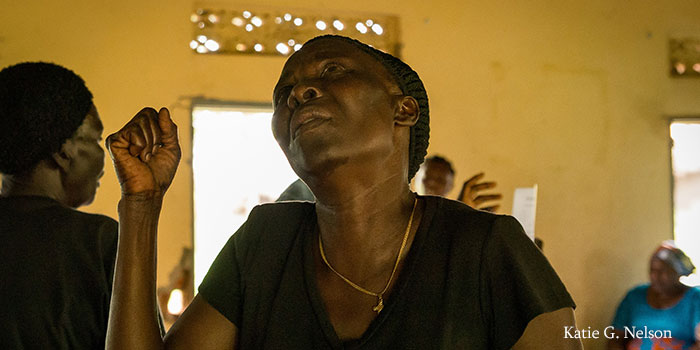Zainab Hawa Bangura, the UN Special Representative of the Secretary-General on Sexual Violence in Conflict, discusses how conflict minerals link the private sector to rape in war, and what we can do to stop it.
The revenue from the global consumer electronics industry is projected to reach a record-breaking $208 billion in 2014. A closely-related business is also booming: in 2013, armed rebels generated almost $1 billion from minerals extracted and stolen from mines in conflict zones in the Democratic Republic of the Congo. As the consumer electronics market grows, so does the international demand for four minerals that are inextricably linked to sexual violence in conflict-affected regions. Gold, tungsten, tantalum and tin power our cell phones, laptops, cameras, tablets and other consumer electronics; they also intensify and perpetuate wars in countries such as the DRC.

The profits made from selling conflict minerals are used to bribe officials, buy weapons, pay soldiers and attract new recruits. This cash flow is essential to supporting the activities of armed groups, and combatants are therefore willing to use absolute brutality to gain access to these valuable resources. They systematically use rape and sexual violence as a tool to control populations and territory. Innocent civilians unlucky enough to live near deposits of such minerals are driven from their homes, subjected to horrific human rights abuses, and sometimes forced into slave labour in the illicit mines. Rape in this context is not an accident, and it cannot be viewed as the collateral damage of warfare. Armed groups use rape as a weapon of war to secure access to conflict minerals.
Sexual violence breaks family bonds and tears at the social fabric of communities. It targets society’s most vulnerable, contributing to long-lasting poverty and insecurity. This high level of instability contributes to the ongoing conflict, driving the demand for conflict minerals as well as the resulting proliferation of sexual violence. The purchasing supply chain may be complicated, but the link between sexual violence and conflict minerals is clear. The unregulated market for conflict minerals perpetuates this vicious cycle of rape and war.
If we tolerate the presence of conflict minerals within our products, the sexual violence used to obtain these minerals will continue unabated.
We are living in a time of unprecedented momentum to end rape in war, but we need the full participation of the private sector to truly end this scourge and help bring peace to these shattered communities. What can the private sector do to break this link between sexual violence and global supply chains?
Corporations need to commit to developing ethical, transparent supply chains that do not source minerals from conflict zones. Industry leaders Apple and Intel are pioneers in the movement to ethically source materials for their merchandise. Once these corporations realized their products were linked to sexual violence, they worked diligently to begin eliminating conflict minerals from their supply chains. This commitment to human rights enhanced the value of their brands. Apple and Intel demonstrate that a company can be both profitable and ethical. Companies that actively engage this issue are industry leaders as well as forerunners in a new model of corporate citizenship.
The largest markets for consumer electronics do not see the daily realities of conflict, but consumers are nonetheless powerful voices in this dialogue. Our purchasing decisions have far-reaching effects on the safety and security of people living in war-torn regions. We can choose to buy products from companies with credible commitments to human rights. We can tell lawmakers that we support regulation requiring companies to complete due diligence to determine just where their minerals come from.
The road before us is long and hard, but if we can regulate the market for conflict minerals, we will take one large step toward the elimination of rape in war.
When we protect vulnerable people from sexual violence, we encourage peacebuilding and national reconciliation. This contributes to overall market stability in post-conflict countries, helping to position these societies on a path toward growth. Ending sexual violence helps nurture stable societies and markets that attract foreign investment and trade. By empowering survivors and helping them to reintegrate into their communities, we foster economic self-sufficiency.
The people who suffer as a result of conflict minerals and sexual violence are our partners in commerce and development; they need humane commitments from the private sector to unlock their potential for growth. We cannot advance the global development agenda without providing safety and security for the most vulnerable among us.
__________________________________________________________________________________
Learn more about conflict resources and sexual violence by attending the LSE public lecture by Ms. Zainab Hawa Bangura, the UN Special Representative of the Secretary-General on Sexual Violence in Conflict on 10 at 6pm.
The Office will also co-host two events at the Ending Sexual Violence Summit at the Excel Centre, one on 10 June at 14:00 on conflict minerals and the other on 11 June at 18:30 with Steven Spielberg’s Shoah Foundation on the testimony of survivors.
Recommendations for further reading:
PricewaterhouseCoopers released its annual survey on conflict mineral reporting compliance in April 2014. It predicted that stakeholders will demand more transparency in conflict-mineral sourcing initiatives in the future.
Tim Mohin, chairman of the Electronics Industry Citizenship Coalition, discussed industry leaders who are also pioneers in the fight against sexual violence and conflict minerals.
The Democratic Republic of the Congo is a key location for the illicit mining and selling of conflict minerals. In 2013, the Enough Project for Africa estimated that armed rebels in the DRC generated almost $1 billion from the sale of conflict minerals. To understand more about this complex war and the role of conflict minerals, we suggest Dancing in the Glory of Monsters: The Collapse of the Congo and the Great War of Africa by Jason Stearns.





